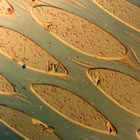What is unique about the COBRA PzF is the coating on the stent: it's a nano-thin coating of Polyzene®-F polymer, approximately 100 times thinner than the polymers found on currently available drug-eluting stents. The implications of this coating are that the stent may lead to faster and more natural healing of the artery and reduce the need for long term dual antiplatelet therapy (DAPT), in effect equalling the outcomes of drug-eluting stents without the need for long-term DAPT.
The COBRA PzF currently has the CE Mark and is available for sale in European and other OUS markets.
The big challenge for the COBRA will be whether the outcomes can meet or surpass those of the current second and third generation drug-eluting stents. Intuitively the technology makes sense. However, another different avenue of exploration, the Genous stent, manufactured by Orbus Neich, also seemed like a revolutionary idea: a stent whose coating "captured" endothelial progenitor cells, thus promoting rapid healing with little need for DAPT. While clinical trials proved the stent to be safe, there was a trend towards increased restenosis. And in a small but important trial, presented in 2009 (GENIUS-STEMI), the Genous stent actually performed less effectively than a bare metal stent, and was associated with the only instances of stent thromboses in the study.
The safety issue of lower stent thrombosis is, of course, one of the potential features of the COBRA stent; however, this current study of only 300 patients is not powered to accurately measure the incidence of such a low frequency event.
CeloNova's Coronary Stent System Could Mean Faster Healing of Arteries and Greatly Reduced Use of Blood-thinning Medication
March 18, 2014 -- San Antonio, Texas -- CeloNova BioSciences, Inc., today announced that the U.S. Food and Drug Administration (FDA) has granted approval to start an investigative device exemption (IDE) trial for its novel coronary stent system – the Cobra PzF™ coronary stent system. Coronary stents are thin wire mesh devices used in minimally invasive heart surgery to prop open clogged blood vessels of the heart.
The Cobra PzF coronary stent is made of Cobalt Chromium Super Alloy and is coated with an advanced nano-thin coating of Polyzene®-F polymer, which is approximately 100 times thinner than coating on currently available commercial coronary stents. Earlier generation Polyzene-F stents have been studied and results published in scientific journals. CeloNova's Cobra PzF stent builds on this knowledge and improves on the earlier generation Polyzene-F stent technology.
"The Polyzene-F nano-coating technology, when combined with a next-generation stent and delivery system, is a potential game-changer," according to Jane Ren, Ph.D., CeloNova BioSciences Chief Technology Officer. "Early indications are that the nano-coated stent leads to a much faster, natural healing of the artery and also would reduce the need for long term blood-thinning medication."
"In addition to the IDE trial, we are also undertaking new scientific studies to expand our clinical evidence," she said.
The IDE trial will study the Cobra PzF, Polyzene-F stent technology in patients with heart disease. It will enroll patients in multiple research centers across the United States and in Europe. The trial is being led by the distinguished researcher, Dr. Donald Cutlip, of Harvard Medical School, Boston.
"We are excited to move ahead with the study of this novel device in a clinical trial designed for initial approval in the United States," said Dr. Cutlip. "We also look forward to subsequent studies that will be designed to test what appear to be unique safety features of the device."
CeloNova BioSciences CEO Martin Landon said, "Our vision is to bring new, unique and disruptive products to market that significantly improve patient care across the full care continuum. Recent indication expansion for our Embozene product to treat benign tumors in the uterus, as well as this IDE trial approval for our Cobra PzF stent to treat heart disease, are two examples of how we are working to bring significant clinical and economic value to patients and customers."
The company announced on March 11 that the FDA had issued 510(k) clearance expanding CeloNova BioSciences' Embozene® microsphere product to include the treatment of uterine fibroids. That approval now gives women suffering from uterine fibroids an important treatment option – uterine fibroid embolization (UFE) – as an alternative to a hysterectomy operation.
About the Company
CeloNova BioSciences, Inc., headquartered in San Antonio, Texas, is a global medical device company that develops, manufactures and markets a family of Interventional Cardiology and Endovascular products. Our products are developed and manufactured in Carlsbad, California, U.S.A. and Ulm, Germany. The Company's regional offices are located in Germany, France, United Kingdom, Netherlands and Austria. For additional information about CeloNova BioSciences, see the company website at www.celonova.com.
The CeloNova BioSciences, Cobra PzF™, Polyzene®-F, and Embozene® names and logos are registered to CeloNova BioSciences, Inc. All product names in any character format and/or with the trademark symbol are trademarks of CeloNova BioSciences, Inc.

